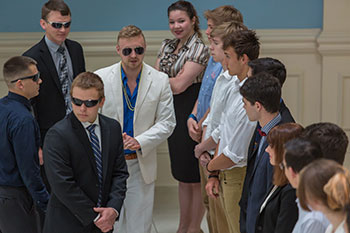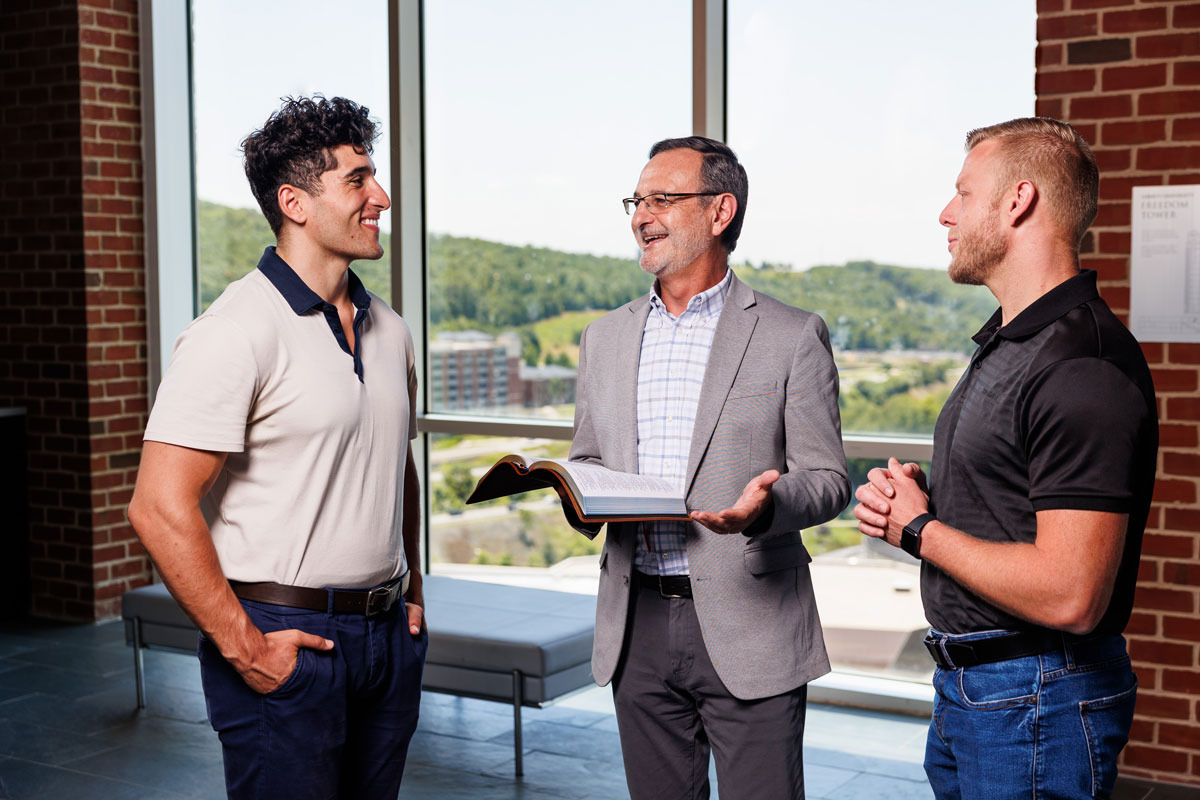Search News Archives
Filter News Articles
Additional Navigation
Strategic intelligence operation thwarts simulated threat
April 27, 2016 : By Drew Menard/Liberty University News Service
 |
| A security team of Liberty University students protect a potential mark in a simulated strategic intelligence exercise. |
A line of Liberty University students, sharply dressed, waited in the Grand Lobby of DeMoss Hall on Saturday morning to greet a “VIP” — an alumnus acting as a Middle Eastern prince — as he was escorted in by a team of criminal justice students working as a security detail. They were dressed (as one would expect) in dark suits and sunglasses. The “prince” stood out amid the darkly dressed figures in a white suit with an open-collared blue shirt. The lobby and front steps were littered with more sunglass-clad students, working to keep the perimeter secure.
Upstairs on the third floor, out of sight of the event, about a dozen students huddled around computers in a dim classroom — a command center — monitoring a steady flow of information, attempting to identify and thwart a simulated threat.
The simulation was the culmination of a semester-long strategic intelligence project involving over 80 students and 10 instructors. A number of disciplines were represented, including Helms School of Government programs in strategic intelligence, pre-law, and criminal justice, as well as the School of Business, the School of Engineering & Computational Sciences, and the Department of Modern Languages. A number of Liberty’s U.S. Army ROTC cadets were involved as well. Together, the team formed the Liberty University Joint Terrorism Task Force.
The command team knew a threat was coming during the simulation. They just did not know what, when, who, or where. So, as “intel” came in, students manned white boards to outline action plans and create a timeline of events while others sifted through digital mug shots of possible “suspects.” One student maintained constant contact with the security team downstairs via radio.
In the lobby, senior criminal justice ROTC student Jordan Russell worked with the “law enforcement” team to keep the perimeter secure.
“It was definitely intense,” he said. “We were going into the dark quite a bit. I’m sitting there thinking, ‘This is going to all fall on me if it doesn’t go well.’ But I had a really good team. They took (personal) initiative.”
Shortly after the “prince” entered, he was hastily escorted out by his detail, who said they questioned the security of the perimeter — though the spectacle had seemed largely uneventful.
Unbeknownst to viewers and passersby, a would-be “assassin” had been stopped before breaching the perimeter.
“They actually saw the guy come in and three people stopped him there and held him,” Russell said. “They kept him from getting close to the target.”
The event’s organizers wanted to see the team prevent physical contact between the suspect and the target but expected him to get a bit closer than he did.
“They came through, they found what they were looking for,” said government professor Bill Waddell, who teaches strategic intelligence and oversaw the project.
Months of dedication, coordination, and work preceded Saturday’s exercise. A similar (though smaller) exercise was held last spring, jumpstarting a semester of planning.
While the operation was designed to augment the studies of students in Liberty’s strategic intelligence program, in order to craft an authentic experience, students from an array of disciplines were involved.
All involved were volunteers in a co-curricular activity, taking part out of a desire to strengthen their skills and gain valuable experience.
“This is totally unique,” Waddell said, “for these guys to not only experience working together as a leadership team but to be addressing real world situations.”
“Nowhere in the U.S., to my knowledge, is there an instructor-led, co-curricular activity like this joint task force, wherein a group of students from multiple disciplines gather data and respond to a situation reflecting real-world events,” added Dr. Joel Cox, assistant professor of criminal justice/government.
The LUJTTF members were tasked with gathering intelligence — in a simulated scenario — pertaining to security in Central Virginia over the course of the semester and thwarting possible threats.
To add some real-world disruption to the structure, some members were pulled out to help craft the scenario, to leak the tidbits of information that would ultimately, if properly analyzed, lead to the team’s success. The scenario architects were called Team Peregrine.
“The biggest challenge on our end was making a realistic scenario,” said Jordan Russell, a senior criminal justice major from Team Peregrine. “Also, taking five different people who are all very Type A (ambitious, competitive), and to coordinate all of those ideas in order to create a (unified) project.”
Kristen Covey, professor of Russian, helped incorporate foreign languages into the project; a number of her students were involved with intelligence and linguistics.
“My biggest desire was for students, especially in intelligence, to not be frightened by foreign languages,” she said. “I think for authenticity, it empowered them, because they know that at any point they can find any piece of information they want.”
As the scenario unfolded, various students were brought in to lend their expertise. SECS students studying cyber security contributed greatly, helping to decode information hidden in computer programs or to break into servers crafted by Peregrine. Engineering students helped to analyze the schematics of an object — which turned out to be a digitally controlled natural gas control valve — that played a key role in the smuggling/assassination scheme.
Just as government organizations compartmentalize information, so did the Blue Team. Saturday’s security detail was assembled and trained only a few weeks before the event, with no information on any possible threats. The welcoming group was assembled the day before.
“It was great working with a taskforce and so many different groups (and) getting those people together, seeing how they’re going to use their skills,” Russell said.
Aaron, who is studying strategic intelligence and Russian and asked that his full name not be shared due to his career aspirations in intelligence, said the project was a great way to practice skills in a realistic scenario and to develop them while working with a lot of entities.
“(Strategic intelligence) is really just about common sense, on how to pay attention to the world at large and see it for facts that are there and not on the political spin,&
rdquo; he said. “When implementing it, it’s knowing how to research and understand what is going on in the world.”


